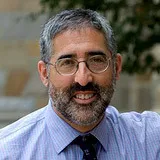David Chapman '82

Chapman is director of the finance department's doctoral program in the Carroll School of Management at Boston College. His research and teaching interests include asset pricing theory and portfolio management.
I have had the privilege of giving the honors exam in financial economics twice. As I reflect on those experiences, I am struck by the maturity and confidence of the students that I examined. They were all poised and articulate, well prepared, and seemingly sure of where they were going. They all seemed to have great jobs lined up and were ready to leave Swarthmore. The oral portions of the exams were invariably more discussions of current events in financial markets than intense "grilling" of the students. I wonder if I appeared the same way to my examiners? Is there something in the preparation of the Honors Program that breeds at least the outward appearance of confidence and poise?
As a part of my responsibilities at Boston College, I am the head of the doctoral program in the finance department at the Carroll School of Management. We have fine (and successful) doctoral students, but both times I gave the exam at Swarthmore, I found myself leaving campus wishing that I could take at least one of the graduating students with me. The opportunity to serve as an outside examiner has made me appreciate the unique character of the Honors Program - and it makes me glad that I am not trying to get into Swarthmore today. I doubt whether I'd stand a chance compared to the students that I have examined.



